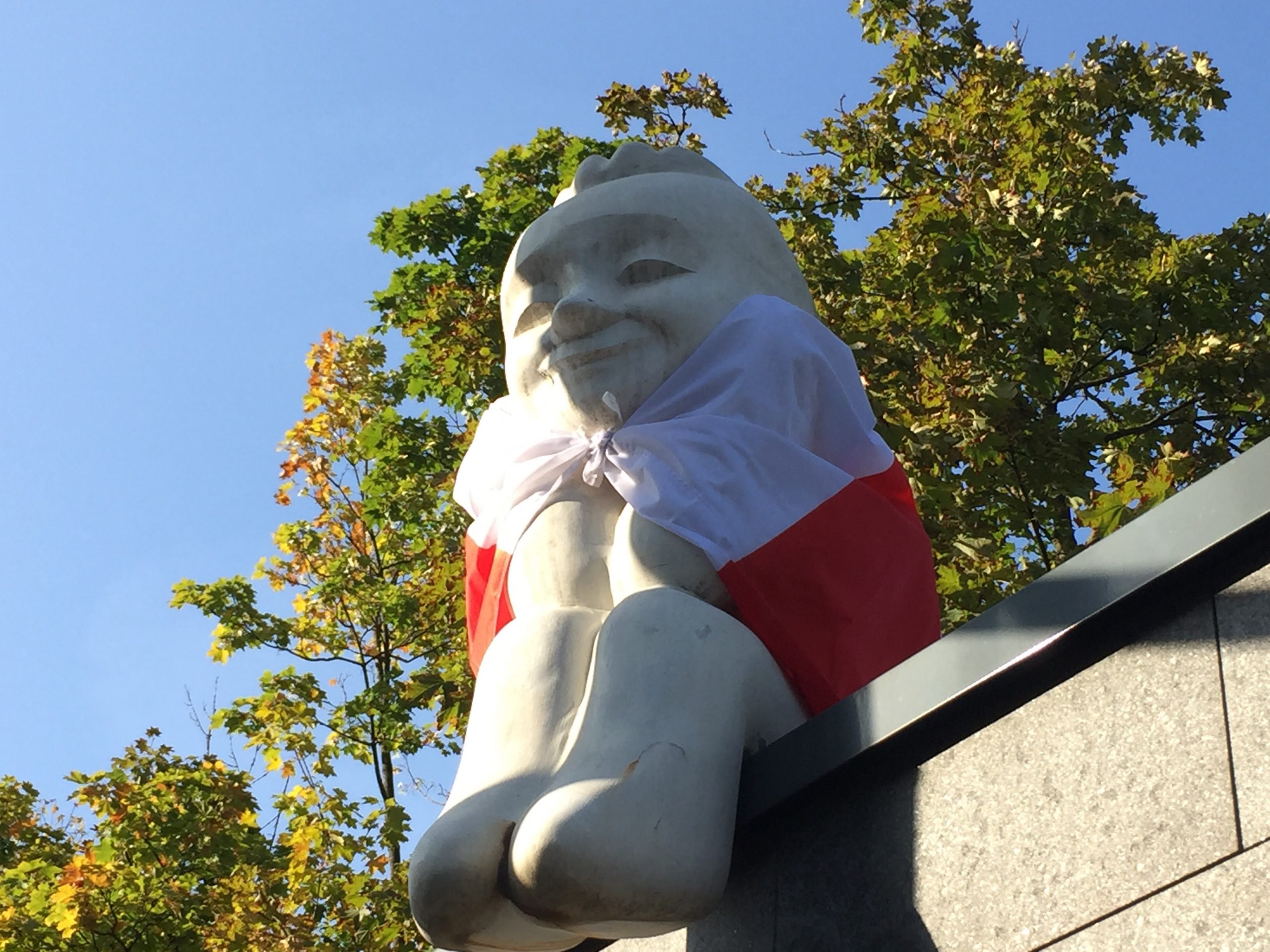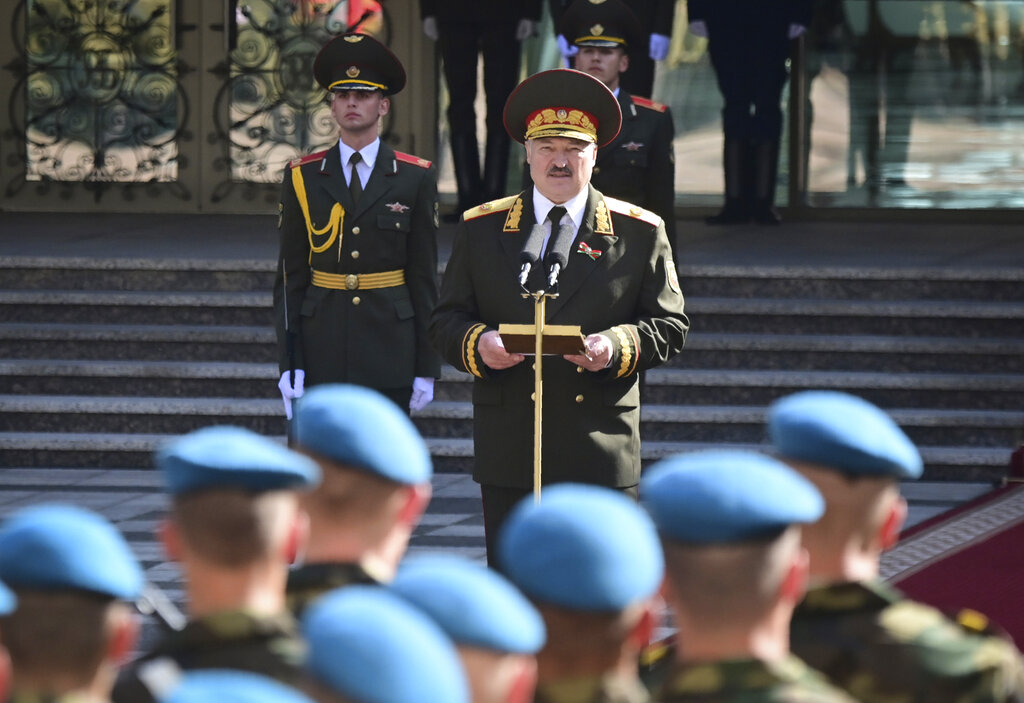VILNIUS, Lithuania — A white and red Belarusian flag is draped over an angel statue outside the Lithuanian Foreign Ministry building in Vilnius.
The symbol of this Baltic capital also reflects Lithuania’s unexpected role as chief harbinger of democratic transition in the Russia-aligned nation suffering widespread human rights abuses just 20 miles across its southern border.
“It was not this task to take some leadership role,” Foreign Minister Linas Linkevicius told the Washington Examiner Wednesday in his Vilnius office. “Vilnius is the place for those who are suffering because of the oppression.”
Hundreds of thousands of protesters again gathered in Minsk over the weekend to call for free and fair elections after Belarusian President Alexander Lukashenko ahead of his inauguration Wednesday.
Lithuanians who threw off the shackles of Soviet communism 30 years ago formed a human chain from Vilnius to the Belarusian border in August, reminiscent of their own struggle for democracy.
And they are demanding their government to do more to foment democratic transition in a country ruled by authoritarian Lukashenko for 26 years.

In August, following disputed elections and with her husband already in jail, opposition candidate Svetlana Tikhanovskaya fled to Lithuania to join her children who had already been given protected status by the Lithuanian government.
Linkevicius recalls the days when Tikhanovskaya first arrived in Vilnius.
“At the beginning, she was really very depressed,” he said. “It was very difficult for her to assume this role.”
Lithuania is now paving the way for hundreds more opposition members who faced beatings and torture to take refuge in the European Union country.
Meanwhile, Russia is staking out its place, too, trying to prevent a Western-aligned government closer to its western border.
Moscow sent its third battalion of airborne troops to Belarus Monday, part of its “Slavic Brotherhood” exercise, but conveniently shoring up Lukashenko’s grip on power.
“Russian troops are on the soil exercising how to defend an attack from NATO,” Linkevicius said. “We will not respond to any of these provocations just to prove this rhetoric, which is fake.”
Vilnius University professor and Belarus expert Vytis Jurkonis told the Washington Examiner that Lithuania has historically been a hub for Belarusian democracy activists and intellectuals. Lithuania has been consistently vocal about democracy and human rights in Russia as well, he added.
“I think we have a way bigger potential to actually contribute and help civil society in Belarus,” he said.
Never mind that an estimated 30% of Belarusian commerce passes through Lithuania’s Port of Klaipedas, and many Lithuanian businesses would suffer if that trade was diverted to Russia.
“We are accustomed to living in this complicated neighborhood, we already proved that. If they are shooting themselves in the foot, we’ll diversify,” he said.
Linkevicius said he is doing the hard work of coalition building in the EU to sanction Belarus. Multilaterally with Baltic states Latvia and Estonia, he has worked to impose travel restrictions on Belarusian officials who were part of the crackdown.
The foreign minister is also calling for prosecutions for those who are committing crimes.
“If you hear about these accounts, about this brutality — violations, rapes, the torturing,” he said. “Even if a small amount of this is true, it’s already too much. These people must be kept accountable.”

Request for U.S. leadership
Linkevicius met with U.S. Secretary of State Mike Pompeo in Washington, D.C., last week to discuss the delicate problem of Belarus and how to encourage a democratic transition in Belarus.
“I said it’s very important to coordinate efforts,” he said of his meeting with Pompeo.
He added that he asked the United States to impose sanctions on Belarus, and he called for more than words to support civil society pro-democracy efforts.
“Not just messaging, but also physical support, material support,” he explained.
The foreign minister said he and Pompeo also discussed messaging about the expiration of Lukashenko’s mandate to govern in Belarus and a strong word to Russia not to intervene.
“We don’t know what will be in the future,” he said, noting that Moscow indicated intervention was not necessary “for the time being.”
Washington commentators at a recent Atlantic Council forum assessed that pushing too hard for a pro-European shift in Belarus would antagonize Russia and upset the balance of power in Europe.
Asked if he was worried about Russia, Linkevicius was flippant.
“It’s not our task to make them happy,” he said.
Still, Jurkonis said Lithuanians are demanding that their government do more.
“What we should care about is the future of this democratic Belarus,” he said. “Belarusian people are not afraid anymore. The fundamental question is, ‘Why are we not standing for the principles that define us?’”
